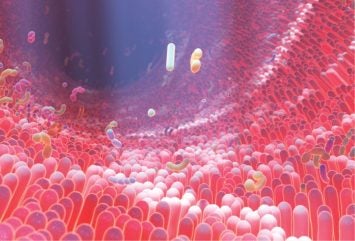
The microbiome plays an undeniably crucial role in our bodies. This is clear across a range of areas, from helping the gut digest food to destroying harmful bacteria. Developing from the moment you’re born, and only growing and diversifying to trillions of microbial cells by the time you’re an adult, this usefulness is matched by complexity. With up to 1,000 species of bacteria in the microbiome, each has an essential role in the body and for human health. That’s true from Firmicutes – the main bacteria for metabolising undigested food – to Lactobacillus, which protects the intestinal barrier from infection.
Playing such a significant role on human health, it is little wonder gut health has earned itself the nickname the ‘second brain’ – especially considering the large number of nerves in the gut. One good example here is the so-called ‘vagus’ nerve, the main nerve of the parasympathetic nervous system, which plays an important role in regulating mood, heart rate, digestion and immunity. With so much neural activity linked to the gut, meanwhile, it makes sense that interest in the relationship between gut health and mental disorders is growing.
Consider, for instance, the frustrating condition of irritable bowel syndrome (IBS). As Trevor Lawley, co-founder and chief scientific officer at Microbiotica and group leader at the Wellcome Sanger Institute explains, this disease is often linked to anxiety and depression. According to a number of studies, bacteria responsible for bowel inflammation are found in higher numbers in people with neurological disorders, even as bacteria associated with higher quality of life indicators are depleted. “We know from other human trials that inflammation is a major factor impacting depression, anxiety, cognitive disorders and more,” says Dr Uma Naidoo, a nutritional psychiatrist and the author of several books on the link between health and diet.
Gut feelings
How to explain these striking links? Naidoo takes up the story. “The primary reason gut bacteria have such a profound effect on mental health,” she explains, “is that they are responsible for making many brain chemicals. If normal gut bacteria are not present, production of neurotransmitters such as dopamine, serotonin, glutamate, and gamma-aminobutyric acid (GABA) – all critically important for the regulation of mood, memory, and attention – is impacted.” With the gut responsible for providing 95% of the body’s serotonin, and regulating mood among other body functions such as sleep and digestion, the presence of certain bacteria in the gut is clearly important.
“Many psychiatric disorders are rooted in deficits and imbalances of these chemicals,” Naidoo adds. “When your gut bacteria are altered, you risk doing damage to this complex web of body and brain function.” Indeed, several studies have shown that people with psychological disorders have different species of bacteria compared with healthy people. Naidoo, for her part, points to a study in 2019, by psychiatrist Stephanie Cheung and her colleagues, who reported that patients with depression had at least 50 different types of bacterial species in their gut microbiome, compared to those without depression.
This is not the only project focused on identifying the involvement of gut microbiota in psychiatric disorders either. For instance, a study in Frontiers in Microbiology found that there was a 36% higher abundance of Clostridium difficile in those with depression. Another study found depression-like symptoms after transplanting microbiota from depressed patients to animals. That’s echoed by current research too. One example is a project conducted by the Wellcome Sanger Institute, investigating the gut microbiome and breast milk in 10,000 mother-baby pairs to find out how the microbiome in early childhood impacts mental health later in life.
1/3
Those surveyed who try to use probiotics.
IFIC’s 2021 Food and Health Survey
According to the Wellcome Sanger study, disruptions to the microbiome are thought to play a role in a number of diseases and conditions – and though the evidence is growing, how this might work is unclear. “In terms of how diet, the microbiome and mental health come together” says Lawley, “I think we all agree there’s something that we don’t quite understand yet.” By syncing this data that tracks early pregnancy to childhood, and including different aspects of health and social circumstances, the study hopes to identify how the microbiome comes together to lead to healthy babies – or else babies with certain disabilities.
Tummy time
With the link between gut microbiome and mental health increasingly scrutinised, can other factors help mitigate the risk of mental disorders through the gut? Food has long been associated with various health benefits – and as Naidoo explains, can the risk of depression, brain fog, Alzheimer’s and more. To have a healthy microbiome, it is therefore essential to eat a healthy, balanced diet to support the growth of healthy bacteria “One of the mechanisms involved in the connection between diet and mental well-being lies in the gut,” Naidoo explains, “and specifically in the hands of the trillions of microorganisms that populate our bowel.”
“In terms of how diet, the microbiome and mental health come together, I think we all agree there’s something that we don’t quite understand yet.”
Trevor Lawley
“I think people recognise that you are what you eat,” agrees Lawley. “We’ve all experienced eating something and you feel bloated or feel lousy.” For functional gastrointestinal disorders – such as IBS – diet can play an important role in reducing symptoms of abdominal pain, bloating, diarrhoea or constipation. “There’s one effective diet intervention called low FODMAP,” explains Lawley. Research discovered that the digestive system can’t break down this particular subset of carbohydrates, which consists of starches, sugars and fibres in food. Instead of breaking them down, the bacteria in our gut ferment them, which can lead to uncomfortable symptoms in some people. Following a low FODMAP diet may, therefore, be beneficial for those with gastrointestinal problems. As researchers in San Antonio, Texas, uncovered, three out of four people reportedly experiencing fewer symptoms after following this diet.
“The primary reason gut bacteria have such a profound effect on mental health is that they are responsible for making many brain chemicals. If normal gut bacteria are not present, production of neurotransmitters such as dopamine, serotonin, glutamate, and gamma-aminobutyric acid – all critically important for the regulation of mood, memory, and attention – is impacted.”
Dr Uma Naidoo
Another option is probiotics, something a growing number of consumers are aware of. According to the IFIC’s 2021 Food and Health Survey, for instance, a third of survey respondents actively try to consume probiotics. So-called psychobiotics are lesser-known – but the term is used to signify a probiotic being studied or used to improve mental health, and could be a game changer if they’re proved to work. There are already a few psychobiotics on the market, such as Bened Life’s Neuralli Mood, which combines strains of probiotics and postbiotics from healthy guts, with some research suggesting certain probiotic strains can affect serotonin and dopamine while regulating gut health.
3in4
People experiencing few symptoms after following a low FODMAP diet.
www.gastroconsa.com
Despite the growing field of psychobiotics, however, the jury is still out on whether probiotics actually work. Certainly, more human trials are needed to determine whether they can promote healthy gut bacteria for mental health. Lawley, for his part, is also sceptical of the benefits that current probiotics can offer: “I think the whole probiotic industry is going to come under increased scrutiny in the next few years because it’s not really strong science that underpins a lot to the probiotic industry.”
“Supplements can potentially alleviate nutrient deficiencies,” stresses Naidoo. “However, they cannot act as a proper substitute for a healthy diet. As a nutritional psychiatrist, I am a proponent of ‘food first’.” All the same, neither a healthy diet nor probiotics should replace medical or psychiatric treatment if necessary; healthy eating to encourage good bacteria in the microbiome should dovetail with medical help where appropriate. In short, while it’s clear that diet and mental health are inextricably linked, it’s similarly true that food is just one tactic to cultivate a healthy microbiome and improve mental health – though importantly, it’s one within the consumer’s control.





